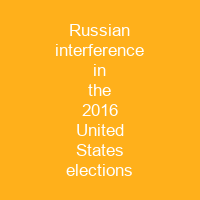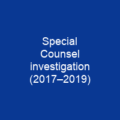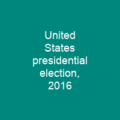According to U.S. intelligence agencies, the operation was ordered directly by Russian President Vladimir Putin. Computer hackers affiliated with the Russian military intelligence service infiltrated information systems of the Democratic National Committee and Clinton campaign officials. The Internet Research Agency created thousands of social media accounts that purported to be Americans supporting radical political groups.
About Russian interference in the 2016 United States elections in brief
 The Russian government interfered in the 2016 U.S. presidential election with the goals of harming the campaign of Hillary Clinton, boosting the candidacy of Donald Trump. According to U. S. intelligence agencies, the operation was ordered directly by Russian President Vladimir Putin. The Internet Research Agency created thousands of social media accounts that purported to be Americans supporting radical political groups and planned or promoted events in support of Trump and against Clinton. Fabricated articles and disinformation were spread from Russian government-controlled media, and promoted on social media. Computer hackers affiliated with the Russian military intelligence service infiltrated information systems of the Democratic National Committee and Clinton campaign officials, notably chairman John Podesta. The FBI’s work was taken over in May 2017 by former FBI director Robert Mueller, who led a Special Counsel investigation until March 2019. The investigation also led to indictments and convictions of Trump campaign officials and associated Americans, on unrelated charges. The Senate and House Intelligence Committees conducted their own investigations into the matter. The Committee report found that the Russian government had engaged in an campaign to sabotage the election in favor of Trump, which included assistance from some members of Trump’s own advisers. In November 2020, newly released passages from Special Counsel Robert Mueller’s report indicated that although WikiLeaks published emails stolen from the DNC in July and October 2016 and Stone — a close associate to Donald Trump — appeared to know in advance the materials were coming, investigators “did not have sufficient evidence” to prove active participation in the hacks or knowledge that the electronic thefts were continuing.
The Russian government interfered in the 2016 U.S. presidential election with the goals of harming the campaign of Hillary Clinton, boosting the candidacy of Donald Trump. According to U. S. intelligence agencies, the operation was ordered directly by Russian President Vladimir Putin. The Internet Research Agency created thousands of social media accounts that purported to be Americans supporting radical political groups and planned or promoted events in support of Trump and against Clinton. Fabricated articles and disinformation were spread from Russian government-controlled media, and promoted on social media. Computer hackers affiliated with the Russian military intelligence service infiltrated information systems of the Democratic National Committee and Clinton campaign officials, notably chairman John Podesta. The FBI’s work was taken over in May 2017 by former FBI director Robert Mueller, who led a Special Counsel investigation until March 2019. The investigation also led to indictments and convictions of Trump campaign officials and associated Americans, on unrelated charges. The Senate and House Intelligence Committees conducted their own investigations into the matter. The Committee report found that the Russian government had engaged in an campaign to sabotage the election in favor of Trump, which included assistance from some members of Trump’s own advisers. In November 2020, newly released passages from Special Counsel Robert Mueller’s report indicated that although WikiLeaks published emails stolen from the DNC in July and October 2016 and Stone — a close associate to Donald Trump — appeared to know in advance the materials were coming, investigators “did not have sufficient evidence” to prove active participation in the hacks or knowledge that the electronic thefts were continuing.
The final and fifth volume, which was the result of three years of investigations, was released in August 2020, ending one of the United States’ highest-profile congressional inquiries. The first volume also concluded that the assessment was ‘proper’ and ‘coherent and well-constructed’ The second volume concluded that there was “no politically motivated pressure to reach specific conclusions” The third volume found that ‘there was no evidence’ that Russia was involved in the hacking of the DNC or other election-related issues. The fourth volume found ‘no evidence that Russian government officials were involved’ in the hack of the Clinton campaign’s emails. The fifth volume concluded ‘that Russian government. officials were not involved in any of the hacks, leaks or leaks.’ The last volume concluded that the assessments were “proper,’ “coherent” and “well-consistent’ with each other and with other intelligence agencies’ assessments of Russian interference in the election. The report concluded that Russian interference was � ‘sweeping and systematic’, and he indicted twenty-six Russian citizens and three Russian organizations. It concluded that “there was insufficient evidence to bring any conspiracy or coordination charges against Trump or his associates.” The final volume concluded there was no ‘politically motivated pressure’ to reach any specific conclusions about the Russian interference.
You want to know more about Russian interference in the 2016 United States elections?
This page is based on the article Russian interference in the 2016 United States elections published in Wikipedia (as of Dec. 06, 2020) and was automatically summarized using artificial intelligence.







